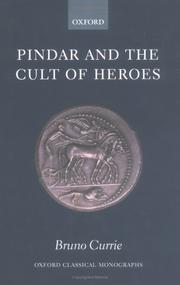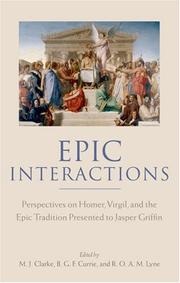| Listing 1 - 8 of 8 |
Sort by
|

ISBN: 0199277249 Year: 2005 Volume: *31 Publisher: Oxford [etc.] : Oxford University Press,
Abstract | Keywords | Export | Availability | Bookmark
 Loading...
Loading...Choose an application
- Reference Manager
- EndNote
- RefWorks (Direct export to RefWorks)
Athletics in literature --- Athlétisme dans la littérature --- Atletiek in de literatuur --- Games in literature --- Greece in literature --- Griekenland in de literatuur --- Grèce dans la littérature --- Helden in de literatuur --- Heldendom in de literatuur --- Heldhaftigheid in de literatuur --- Heroes in literature --- Heroism in literature --- Héros dans la littérature --- Héroïsme dans la littérature --- Jeux et récréations dans la littérature --- Spelen in de literatuur --- Laudatory poetry, Greek --- Odes, Greek --- Greek odes --- Greek poetry --- History and criticism --- Pindar --- Pindare --- Píndaro --- Pindaros --- Characters --- Heroes. --- Criticism and interpretation. --- Greece --- In literature. --- Pindarus --- Criticism and interpretation --- Laudatory poetry [Greek ] --- Odes --- Heroes --- Pindaro --- Πίνδαρος
Book
ISBN: 9780198768821 Year: 2016 Publisher: Oxford Oxford University Press
Abstract | Keywords | Export | Availability | Bookmark
 Loading...
Loading...Choose an application
- Reference Manager
- EndNote
- RefWorks (Direct export to RefWorks)
Allusions in literature. --- Homer --- Allusions. --- Hóiméar --- Hūmīrūs --- Homeros --- Homerus --- Gomer --- Omir --- Omer --- Omero --- Ho-ma --- Homa --- Homérosz --- האמער --- הומירוס --- הומר --- הומרוס --- هومر --- هوميروس --- 荷马 --- Ὅμηρος --- Гамэр --- Hamėr --- Омир --- Homero --- 호메로스 --- Homerosŭ --- Homērs --- Homeras --- Хомер --- ホメーロス --- ホメロス --- Гомер --- Homeri --- Hema --- Pseudo-Homer --- Pseudo Omero --- Homère --- Allusions in literature
Book
ISBN: 1283222604 9786613222602 0191557196 9780191557194 0199586705 9780199586707 9780199586707 0199586705 0191615161 Year: 2010 Publisher: Oxford Oxford University Press
Abstract | Keywords | Export | Availability | Bookmark
 Loading...
Loading...Choose an application
- Reference Manager
- EndNote
- RefWorks (Direct export to RefWorks)
A radical new appraisal of the veneration and cult of heroic men, living and dead, in ancient Greece. Bruno Currie finds the roots of the Hellenistic ruler cult, and hence Roman emperor cult, in the 5th century BC (and earlier), and identifies Pindar's victory odes as a crucial stage in this process.
Laudatory poetry, Greek --- Odes, Greek --- Athletics in literature. --- Heroes in literature. --- Games in literature. --- Greek odes --- Greek poetry --- History and criticism. --- Pindar --- Pindarus --- Pindare --- Píndaro --- Pindaros --- Criticism and interpretation. --- Characters --- Heroes. --- Greece --- In literature. --- Pindaro --- Πίνδαρος
Book
ISBN: 9789004414518 9004414517 9004414525 9789004414525 Year: 2019 Volume: 430 5 Publisher: Leiden: Brill,
Abstract | Keywords | Export | Availability | Bookmark
 Loading...
Loading...Choose an application
- Reference Manager
- EndNote
- RefWorks (Direct export to RefWorks)
"In The Reception of Greek Lyric Poetry in the Ancient World: Transmission, Canonization and Paratext, a team of international scholars consider the afterlife of early Greek lyric poetry (iambic, elegiac, and melic) up to the 12th century CE, from a variety of intersecting perspectives: reperformance, textualization, the direct and indirect tradition, anthologies, poets' Lives, and the disquisitions of philosophers and scholars. Particular attention is given to the poets Tyrtaeus, Solon, Theognis, Sappho, Alcaeus, Stesichorus, Pindar, and Timotheus. Consideration is given to their reception in authors such as Aristophanes, Herodotus, Plato, Plutarch, Athenaeus, Aelius Aristides, Catullus, Horace, Virgil, Ovid, and Statius, as well as their discussion by Peripatetic scholars, the Hellenistic scholia to Pindar, Horace's commentator Porphyrio, and Eustathius on Pindar"--
Greek poetry --- Classical literature --- History and criticism --- Influence --- Classical literature. --- Greek poetry. --- Littérature antique --- Poésie grecque --- Histoire et critique. --- Influence. --- Greek poetry - History and criticism - Congresses --- Greek poetry - Influence - Congresses --- Classical literature - History and criticism - Congresses --- Greek literature

ISBN: 9780199276301 0199276307 0191706019 0191534781 1435607260 Year: 2006 Publisher: Oxford Oxford university press
Abstract | Keywords | Export | Availability | Bookmark
 Loading...
Loading...Choose an application
- Reference Manager
- EndNote
- RefWorks (Direct export to RefWorks)
This collection of essays, written by former pupils, celebrates the career of Jasper Griffin, one of the foremost modern scholars of classical epic. The volume surveys the epic tradition from the eighth century BC to the nineteenth century of our era. Individual chapters focus on: Homer and the oral epic tradition; Homer in his religious context; Herodotus and Homer; Hellenistic epic; Virgil in his literary context; Virgil in his political-cultural context; the Augustan poets and the Aeneid; Statius' Thebaid; Old English and Old Irish epic; Renaissance epic: Tasso and Milton; and the Victorians. The aim of the book is to situate writers of epic in their literary and cultural contexts--an enterprise captured in the term "interaction" in the title. The chapters singly offer insights into some of the foundational poems of the European epic tradition and together take a bold, holistic look at that tradition.
Epic poetry, Classical --- History and criticism. --- Homer --- Virgil --- Griffin, Jasper. --- Criticism and interpretation --- Influence --- Criticism and interpretation. --- Festschrift - Libri Amicorum --- Epic poetry. Classical --- Influence. --- History and criticism --- Vergil --- Virgile --- Virgilio Máron, Publio --- Virgilius Maro, Publius --- Vergili Maronis, Publius --- Homeros --- Homère --- Homerus --- Vergilius Maro, Publius --- Virgilius Maro, Publius, --- Virgilio Marone, P., --- Vergilīĭ, --- Virgile, --- Vergílio, --- Wergiliusz, --- Vergilīĭ Maron, P. --- Vergilīĭ Maron, Publīĭ, --- Verhiliĭ Maron, P., --- Vergil, --- Virgilio, --- Virgilīĭ, --- Virgilius Maro, P., --- Virgil Maro, P., --- ווירגיל, --- וירגיליוס, --- ורגיליוס, --- מרו, פובליוס ורגיליוס, --- فرجيل, --- Pseudo-Virgil, --- Pseudo Virgilio, --- Virgilio Marón, Publio, --- Bhārjila, --- Vergilius Maro, P. --- Vergilius --- Virgilio Marone, P. --- Vergilīĭ --- Vergílio --- Wergiliusz --- Vergilīĭ Maron, Publīĭ --- Verhiliĭ Maron, P. --- Virgilio --- Virgilius Maro, P. --- Virgil Maro, P. --- Pseudo-Virgil --- Pseudo Virgilio --- Virgilio Marón, Publio --- Bhārjila --- Hóiméar --- Hūmīrūs --- Gomer --- Omir --- Omer --- Omero --- Ho-ma --- Homa --- Homérosz --- האמער --- הומירוס --- הומר --- הומרוס --- هومر --- هوميروس --- 荷马 --- Ὅμηρος --- Гамэр --- Hamėr --- Омир --- Homero --- 호메로스 --- Homerosŭ --- Homērs --- Homeras --- Хомер --- ホメーロス --- ホメロス --- Гомер --- Homeri --- Hema --- Pseudo-Homer --- Pseudo Omero --- Marone, Publio Virgilio --- Epic poetry, Classical - History and criticism. --- Homer - Criticism and interpretation --- Homer - Influence --- Virgil - Criticism and interpretation.
Book

ISBN: 1283400316 9786613400314 3110254026 9783110254020 3112190440 3110254018 3110482371 9781283400312 9783110254013 9783110482379 Year: 2011 Publisher: Berlin Boston
Abstract | Keywords | Export | Availability | Bookmark
 Loading...
Loading...Choose an application
- Reference Manager
- EndNote
- RefWorks (Direct export to RefWorks)
This book addresses the many interlocking problems in understanding the modes of performance, dissemination, and transmission of Greek poetry of the seventh to the fifth centuries BC whose first performers were a choral group, sometimes singing in a ritual context, sometimes in more secular celebrations of victories in competitive games. It explores the different ways such a group presented itself and was perceived by its audiences; the place of tyrants, of other prominent individuals and of communities in commissioning and funding choral performances and in securing the further circulation of the songs' texts and music; the social and political role of choral songs and the extent to which such songs continued to be performed both inside and outside the immediate family and polis-community, whether chorally or in archaic Greece's important cultural engine, the elite male symposium, with the consequence that Athenian theatre audiences could be expected to appreciate allusion to or reworking of such poetic forms in tragedy and comedy; and how various types of performance contributed to transmission of written texts of the poems until they were collected and edited by Alexandrian scholars in the third and second centuries BC.
Drama - Chorus (Greek drama). --- Drama -- Chorus (Greek drama). --- Greek drama (Tragedy) - History and criticism. --- Greek drama (Tragedy) -- History and criticism. --- Greek language - Accents and accentuation. --- Greek language -- Accents and accentuation. --- Greek language - Metrics and rhythmics. --- Greek language -- Metrics and rhythmics. --- Greek poetry - History and criticism - Theory, etc. --- Greek poetry -- History and criticism -- Theory, etc. --- Greek poetry --- Greek language --- Drama --- Greek drama (Tragedy) --- Languages & Literatures --- Greek & Latin Languages & Literatures --- Theory, etc --- History and criticism --- Metrics and rhythmics --- Accents and accentuation --- Chorus (Greek drama) --- Chorus (Drama) --- Greek drama --- Greek literature --- Chorus --- E-books --- Theory, etc. --- Metrics and rhythmics. --- Accents and accentuation. --- History and criticism. --- Drama - Chorus (Greek drama) --- Drama -- Chorus (Greek drama) --- Greek drama (Tragedy) - History and criticism --- Greek drama (Tragedy) -- History and criticism --- Greek language - Accents and accentuation --- Greek language -- Accents and accentuation --- Greek language - Metrics and rhythmics --- Greek language -- Metrics and rhythmics --- Greek poetry - History and criticism - Theory, etc --- Greek poetry -- History and criticism -- Theory, etc --- Archaic Greece. --- Choruses. --- Pan-Hellenism. --- Song Performance. --- Transmission.
Book

ISBN: 9783110271959 3110271958 1280569751 9786613599353 3110272016 9783110272017 Year: 2012 Volume: 12 Publisher: Berlin Boston
Abstract | Keywords | Export | Availability | Bookmark
 Loading...
Loading...Choose an application
- Reference Manager
- EndNote
- RefWorks (Direct export to RefWorks)
This volume aims at offering a critical reassessment of the progress made in Homeric research in recent years, focussing on its two main trends, Neonalysis and Oral Theory. Interpreting Homer in the 21st century asks for a holistic approach that allows us to reconsider some of our methodological tools and preconceptions concerning what we call Homeric poetry. The neoanalytical and oral 'booms', which have to a large extent influenced the way we see Homer today, may be re-evaluated if we are willing to endorse a more flexible approach to certain scholarly taboos pertaining to these two schools of interpretation. Song-traditions, formula, performance, multiformity on the one hand, and Motivforschung, Epic Cycle on the other, may not be so incompatible as we often tend to think.
Epic poetry, Greek --- Oral tradition --- Civilization, Homeric --- Memory in literature --- History and criticism --- Civilization, Homeric. --- Memory in literature. --- History and criticism. --- Epic poetry, Greek - History and criticism. --- Epic poetry, Greek -- History and criticism. --- Oral tradition - Greece. --- Oral tradition -- Greece. --- Memory as a theme in literature --- Homeric civilization --- Epic poetry, Greek - History and criticism --- Oral tradition - Greece --- Homer. --- Neoanalysis. --- Oral Poetry. --- Oral Theory. --- Épopées grecques --- Tradition orale --- Civilisation homérique --- Histoire et critique --- Congrès --- Grèce
Book

ISBN: 9780748643974 Year: 2022 Publisher: Edinburgh
Abstract | Keywords | Export | Availability | Bookmark
 Loading...
Loading...Choose an application
- Reference Manager
- EndNote
- RefWorks (Direct export to RefWorks)
| Listing 1 - 8 of 8 |
Sort by
|

 Search
Search Feedback
Feedback About UniCat
About UniCat  Help
Help News
News